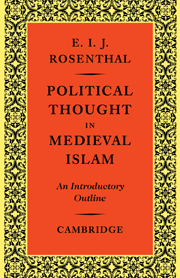Book contents
- Frontmatter
- Contents
- AUTHOR'S NOTE
- ABBREVIATIONS
- INTRODUCTION
- PART I CONSTITUTIONAL LAW AND MUSLIM HISTORY
- PART II THE PLATONIC LEGACY
- V POLITICAL PHILOSOPHY IN ISLAM
- VI AL FĀRĀBĪ: THE FOUNDATION
- VII IBN SĪNĀ: THE SYNTHESIS
- VIII IBN BĀJJA: INDIVIDUALIST DEVIATION
- IX IBN RUSHD: THE CONSUMMATION
- X AL-DAWWĀNĪ: APPLICATION AND INTEGRATION
- APPENDIX: SOME TURKISH VIEWS ON POLITICS
- NOTES
- GLOSSARY
- INDEX
V - POLITICAL PHILOSOPHY IN ISLAM
Published online by Cambridge University Press: 07 May 2010
- Frontmatter
- Contents
- AUTHOR'S NOTE
- ABBREVIATIONS
- INTRODUCTION
- PART I CONSTITUTIONAL LAW AND MUSLIM HISTORY
- PART II THE PLATONIC LEGACY
- V POLITICAL PHILOSOPHY IN ISLAM
- VI AL FĀRĀBĪ: THE FOUNDATION
- VII IBN SĪNĀ: THE SYNTHESIS
- VIII IBN BĀJJA: INDIVIDUALIST DEVIATION
- IX IBN RUSHD: THE CONSUMMATION
- X AL-DAWWĀNĪ: APPLICATION AND INTEGRATION
- APPENDIX: SOME TURKISH VIEWS ON POLITICS
- NOTES
- GLOSSARY
- INDEX
Summary
So far we have considered the views of the jurists on the theory and principles of the khilāfa as an institution required by the Sharīʿa, and the views of moralists and men of affairs on siyāsa, the art of government. Both groups started with and concentrated on the Islamic state; the first took their stand upon constitutional law as part of Fiqh and, in an attempt to vindicate this law in the face of divergent practice in political reality, stated what the khilāfa should be.
The second group accepted political reality, the state as it was, and pronounced on good government in general conformity with the religious and ethical teachings of Islam rather than with the exact provisions of its constitutional law. Their realism had a strong element of expediency, especially when they wrote as men of affairs, and their form and style largely depended on their Persian literary models. Sometimes these models were only superficially adapted to Islamic conditions.
Ibn Khaldūn is in a class by himself and stands out as an independent political thinker firmly rooted in Islam and sharing the historical and political approach of the second group without being content with their didactic aim and literary expository forms. He surveyed the political scene dispassionately, and deduced the laws of political life in its various mutually dependent aspects. He was interested in the reasons for the existence of a state and in the causes of its development and decline.
- Type
- Chapter
- Information
- Political Thought in Medieval IslamAn Introductory Outline, pp. 113 - 121Publisher: Cambridge University PressPrint publication year: 1958
- 1
- Cited by



